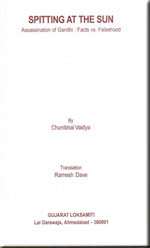
P.O. SEVAGRAM, DIST.WARDHA 442102, MS, INDIA. Phone: 91-7152-284753
FOUNDED BY MAHATMA GANDHI IN 1936
The Spitting At The Sun
[ Assassination of Gandhi : Facts vs. Falsehood ]

SPITTING AT THE SUN
(Assassination of Gandhi :
Facts vs. Falsehood)
Written by :Chunibhai Vaidya
Table of Contents
- Tell The World
- Light Beyond Darkness
- A Word or Two
- Some Points Dealt With In This Book
- Dialogue
- Epilogue
- Appendix 1 : Gandhiji's Speech At The Prayer Meeting
- Appendix 2 : Gandhiji's Speech At The Prayer Meeting
- Appendix 3
- Appendix 4
- Appendix 5
- Charge-Sheet
- About The Author
About This Book
Written by :Chunibhai Vaidya
Translated by :Ramesh Dave
Printed by : Umiya Offset,
Tavdipura,
Ahmedabad - 380 014,
India.
First Published :
November 1998
Printed and Published by :
Gujarat Loksamiti,
Loksamiti Compound
Lal Darwaja,
Ahmedabad - 380 001
Download
Appendix 5
The peace Committee again met on the morning of the 18th January. The absentees of the previous night were present. The representatives of all the important groups and organisations in the city were there, including representatives of the refugees from Karol Bagh, Sabzimandi and Paharganj, the three worst-affected parts of the city. They all accepted the conditions laid down by Gandhiji and gave their signatures to the following pledge:
We wish to announce that it is our heartfelt desire that Hindus, Muslims, Sikhs and members of other communities should once again live in Delhi like brothers and in perfect amity. We take the pledge that we shall protect the life, property and faith of the Muslims and that the incidents which have taken place in Delhi will not happen again.
- We want to assure Gandhiji that the annual fair at Khwaja Qutabuddin's mausoleum will be held this year as in previous years.
- The Muslims will be able to move about in Sabzimandi, Karol Bagh, Paharganj and other localities just as they could in the past.
- The mosques which have been left by the Muslims and which are now in the possession of Hindus and Sikhs will be returned. The areas which have been set apart for the Muslims will not be forcibly occupied.
- We shall not object to the return to Delhi of the Muslims who have migrated from here if they choose to come back, and the Muslims shall be able to carry on their business as before. We give the assurance that all these things will be done by our personal efforts and not with the help of the police or the military.
We request Mahatmaji to believe us and give up his fast and continue to lead us as he has done hitherto.
While the signatures were being collected, news came over the phone from Birla House that Gandhiji's condition had suddenly worsened. Dr. Rajendra Prasad, with some members of the Committee, thereupon hurried to Birla House to explain to Gandhiji in advance the conditions agreed to by the members of the Peace Committee. It would have taken some time for all the members to assemble there and every minute counted.
When all the members had arrived in Birla House, Gandhiji’s room was packed to capacity. The gathering included Pandit Nehru and Maulana Azad, Zahid Husain, the High Commissioner for Pakistan, and representatives of the Delhi Muslims, the R.S.S., the Hindu Mahasabha and various Sikh organizations. The Delhi Administration was represented by the Chief Commissioner and the Deputy Commissioner of Delhi.
Dr. Rajendra Prasad narrated how they had on the previous night after full discussion decided to sign the declaration then and there. But as representatives of some organisations were not present in that meeting they felt they should wait till the remaining signatures were obtained. This had since been done. In the morning meeting even those who had some lingering doubts on the previous night were confident that they could now, with a full sense of their responsibility, ask Gandhiji to break the fast. It had been decided to set up a number of committees to implement the pledge. In view of the guarantees that had jointly and severally been given. Dr. Rajendra Prasad proceeded, they all hoped that Gandhiji would now break his fast. A member described how a procession of 150 Muslims had been taken that morning to Sabzimandi, where they were greeted with fruits and refreshment by the Hindus.
Replying, Gandhiji said that they had given him all that he had asked for, but if their words meant that they held themselves responsible for communal peace in Delhi only and what happened in other places was no concern of theirs, then their guarantee was nothing worth and he would feel, and they too would one day realise, that it was a big blunder on his part to have given up his fast. They should clearly realise the implications of their pledge. What they had achieved in Delhi had to be realised in the whole of India. If things in Delhi were set right, it would set things right in Pakistan, too.
Mahatma Gandhi: The Last Phase, by Pyarelal, Vol-II, pp, 728-29-30.